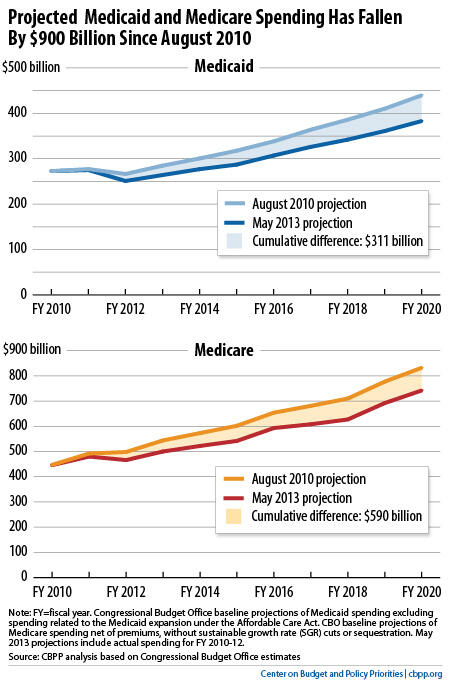BEYOND THE NUMBERS
Health care cost growth has slowed substantially, as the latest projections from the Congressional Budget Office (CBO) make clear Since late 2010, CBO has reduced its projection of cumulative Medicare and Medicaid spending over the 2011-2020 period by $900 billion (or nearly 10 percent over that period).
That date’s important because it was in late 2010 — and based on CBO’s August 2010 projections — when fiscal commission co-chairs Erskine Bowles and Alan Simpson issued their original budget proposal, which called for over $300 billion in Medicare cuts and nearly $60 billion in Medicaid savings through 2020. The original Bowles-Simpson proposal is often considered an appropriate benchmark for evaluating other deficit-reduction plans.
The figure below compares CBO’s Medicare and Medicaid projections from August 2010 with the projections that CBO released last week. (The note to the figure explains adjustments that we have made to provide comparability.) Medicaid spending is $311 billion lower, and Medicare outlays have come down by $590 billion — far more than the savings that Bowles-Simpson recommended.

No one knows how long this good news will continue. Some analysts conclude that fundamental changes in the health care system are responsible for most of the slowdown in cost growth. Others find that the recession is the primary factor, with systemic changes less important.
Even if cost growth remains moderate, however, Medicare and Medicaid spending will keep rising as more baby boomers become eligible for benefits. Making the U.S. health care system more efficient thus remains a major budget challenge.
But CBO’s new projections provide further evidence that Medicare and Medicaid are not in crisis. Responsible reforms, such as those in President Obama’s budget (which would produce $400 billion in health care entitlement savings in the next ten years and $1trillion in savings in the subsequent decade), can help restore fiscal responsibility without shifting costs to vulnerable beneficiaries or states. There is no need for sweeping and misguided changes, such as establishing a per capita cap in Medicaid or raising the age of eligibility for Medicare.
